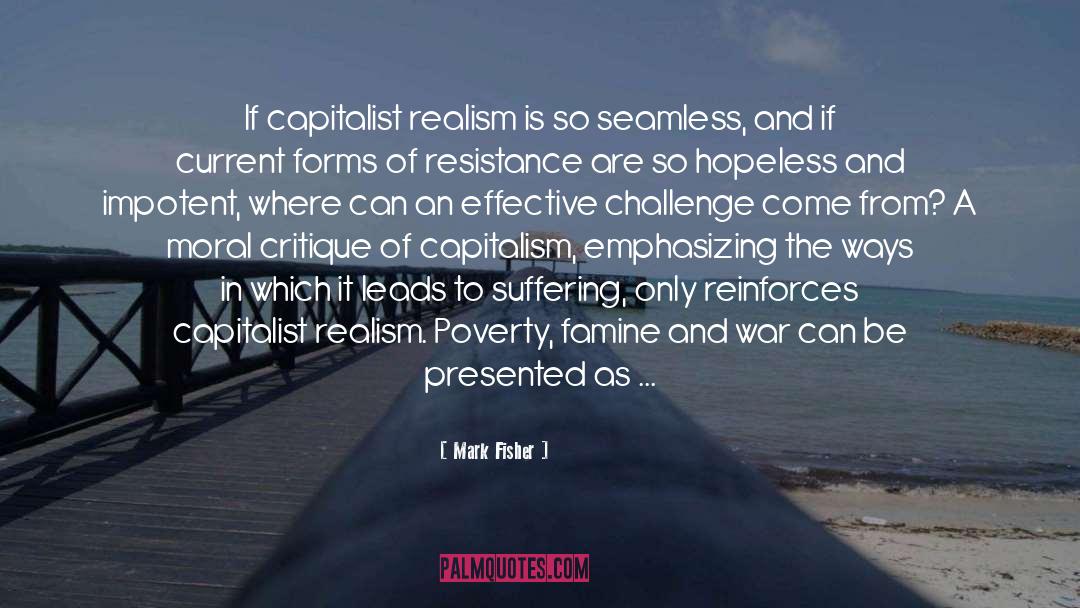Mark Fisher Famous Quotes
Reading Mark Fisher quotes, download and share images of famous quotes by Mark Fisher. Righ click to see or save pictures of Mark Fisher quotes that you can use as your wallpaper for free.
On the one hand, this is a culture that privileges only the present and the immediate - the extirpation of the long term extends backwards as well as forwards in time (for example, media stories monopolize attention for a week or so then are instantly forgotten); on the other hand, it is a culture that is excessively nostalgic, given over to retrospection, incapable of generating any authentic novelty. It may be that Jameson's identification and analysis of this temporal antimony is his most important contribution to our understanding of postmodern/post-Fordist culture.

A film like Wall-E exemplifies what Robert Pfaller has called 'interpassivity': the film performs our anti-capitalism for us, allowing us to continue to consume with impunity.

Capital follows you when you dream.

If the figure of discipline was the worker-prisoner, the figure of control is the debtor-addict.

Capital is an abstract parasite, an insatiable vampire and zombie maker; but the living flesh it converts into dead labor is ours, and the zombies it makes are us.

The slow cancellation of the future has been accompanied by a deflation of expectations. There can be few who believe that in the coming year a record as great as, say, the Stooges' Funhouse or Sly Stone's There's A Riot Goin' On will be released. Still less do we expect the kind of ruptures brought about by The Beatles or disco. The feeling of belatedness, of living after the gold rush, is as omnipresent as it is disavowed. Compare the fallow terrain of the current moment with the fecundity of previous periods and you will quickly be accused of 'nostalgia'. But the reliance of current artists on styles that were established long ago suggests that the current moment is in the grip of a formal nostalgia, of which more shortly.
It is not that nothing happened in the period when the slow cancellation of the future set in. On the contrary, those thirty years has been a time of massive, traumatic change. In the UK, the election of Margaret Thatcher had brought to an end the uneasy compromises of the so-called postwar social consensus. Thatcher's neoliberal programme in politics was reinforced by a transnational restructuring of the capitalist economy. The shift into so-called Post-Fordism – with globalization, ubiquitous computerization and the casualisation of labour – resulted in a complete transformation in the way that work and leisure were organised. In the last ten to fifteen years, meanwhile, the internet and mobile telecommunications technology have altered the
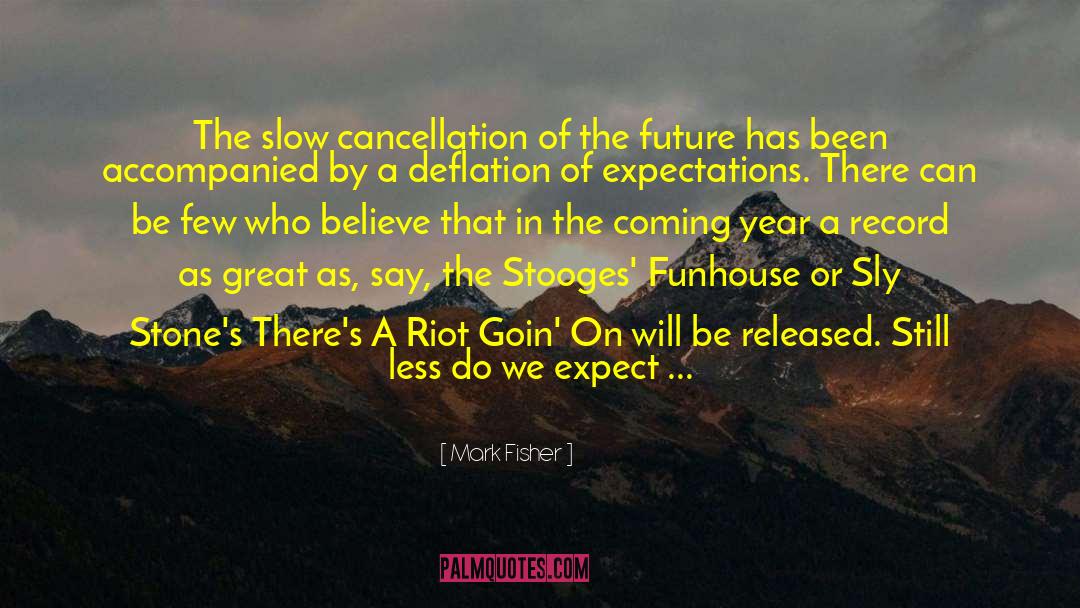
At one level, to be sure, it might look as if Green issues are very far from being 'unrepresentable voids' for capitalist culture. Climate change and the threat of resource-depletion are not being repressed so much as incorporated into advertising and marketing. What this treatment of environmental catastrophe illustrates is the fantasy structure on which capitalist realism depends: a presupposition that resources are infinite, that the earth itself is merely a husk which capital can at a certain point slough off like a used skin, and that any problem can be solved by the market
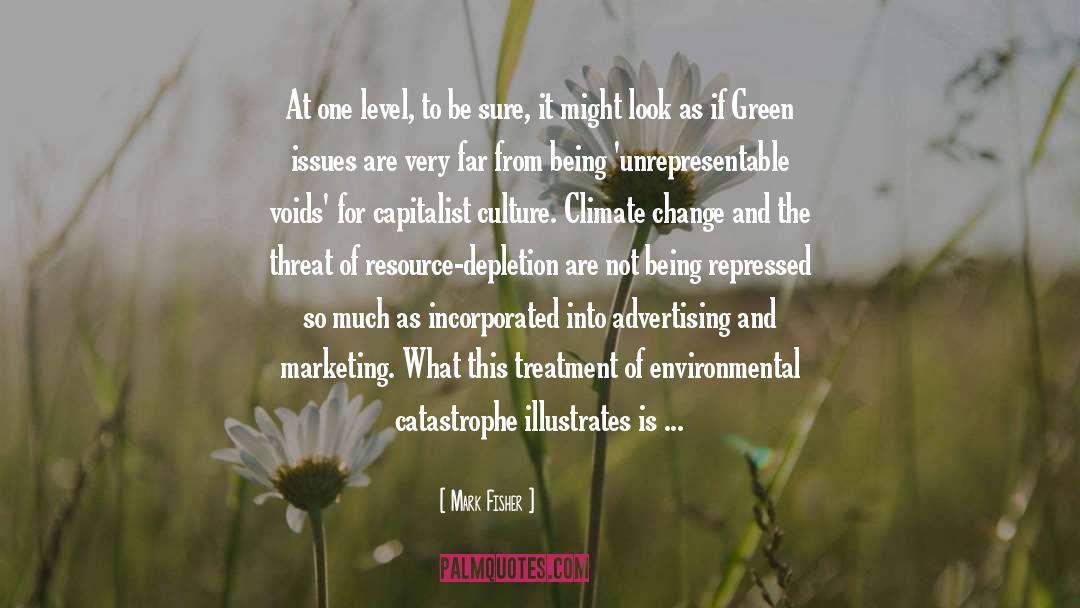
Depressive ontology is dangerously seductive because, as the zombie twin of a certain philosophical wisdom, it is half true. As the depressive withdraws from the vacant confections of the lifeworld, he unwittingly finds himself in concordance with the human condition so painstakingly diagrammed by a philosopher like Spinoza: he sees himself as a serial consumer of empty simulations, a junky hooked on every kind of deadening high, a meat puppet of the passions. The depressive cannot even lay claim to the comforts that a paranoiac can enjoy, since he cannot believe that the strings are being pulled by any one. No flow, no connectivity in the depressive's nervous system.

The ideological blackmail that has been in place since the original Live Aid concerts in 1985 has insisted that 'caring individuals' could end famine directly, without the need for any kind of political solution or systemic reorganization. It is necessary to act straight away, we were told; politics has to be suspended in the name of ethical immediacy. Bono's Product Red brand wanted to dispense even with the philanthropic intermediary. 'Philanthropy is like hippy music, holding hands', Bono proclaimed. 'Red is more like punk rock, hip hop, this should feel like hard commerce'. The point was not to offer an alternative to capitalism - on the contrary, Product Red's 'punk rock' or 'hip hop' character consisted in its 'realistic' acceptance that capitalism is the only game in town. No, the aim was only to ensure that some of the proceeds of particular transactions went to good causes. The fantasy being that western consumerism, far from being intrinsically implicated in systemic global inequalities, could itself solve them. All we have to do is buy the right products.
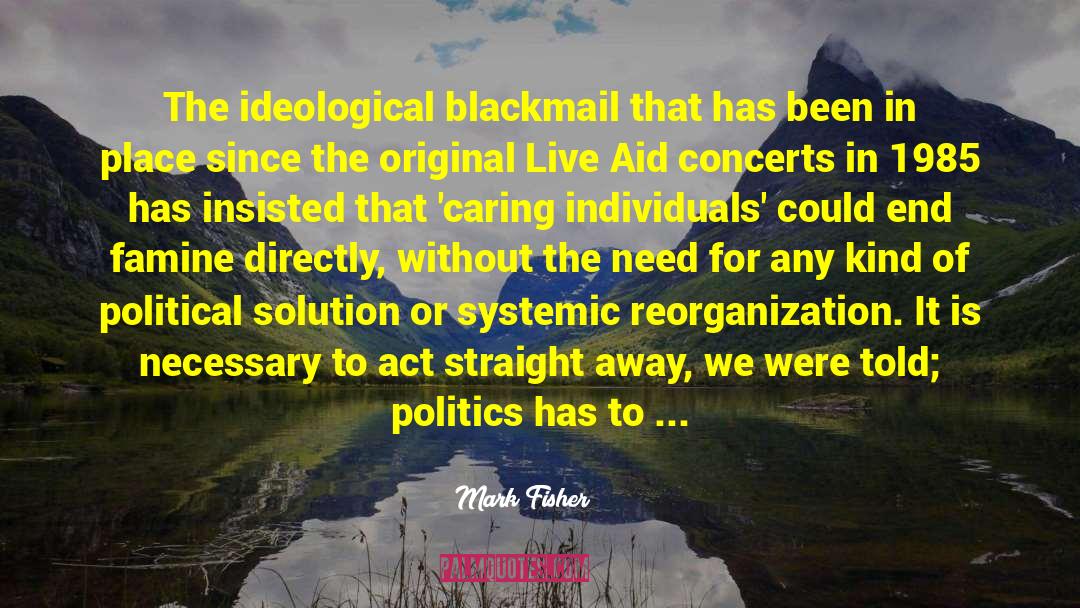
The role of capitalist ideology is not to make an explicit case for something in the way that propaganda does, but to conceal the fact that the operations of capital do not depend on any sort of subjectively assumed belief. It is impossible to conceive of fascism or Stalinism without propaganda - but capitalism can proceed perfectly well, in some ways better, without anyone making a case for it.

We could go so far as to say that it is the human condition to be grotesque, since the human animal is the one that does not fit in, the freak of nature who has no place in the natural order and is capable of re-combining nature's products into hideous new forms.

[W]hat counts as 'realistic', what seems possible at any point in the social field, is defined by a series of political determinations. An ideological position can never be really successful until it is naturalized, and it cannot be naturalized while it is still thought of as a value rather than a fact. Accordingly, neoliberalism has sought to eliminate the very category of value in the ethical sense. Over the past thirty years, capitalist realism has successfully installed a 'business ontology' in which it is simply obvious that everything in society, including healthcare and education, should be run as a business. … [E]mancipatory politics must always destroy the appearance of a 'natural order', must reveal what is presented as necessary and inevitable to be a mere contingency, just as it must make what was previously deemed to be impossible seem attainable.
![Mark Fisher Quotes: [W]hat counts as 'realistic', what Mark Fisher Quotes: [W]hat counts as 'realistic', what](https://palmquotes.com/author/mark-fisher-quotes-1468489.jpg)
Instead of accepting the vast privatization of stress that has taken place over the last thirty years, we need to ask: how has it become acceptable that so many people, and especially so many young people, are ill? The 'mental health plague' in capitalist societies would suggest that, instead of being the only social system that works, capitalism is inherently dysfunctional, and that the cost of it appearing to work is very high.
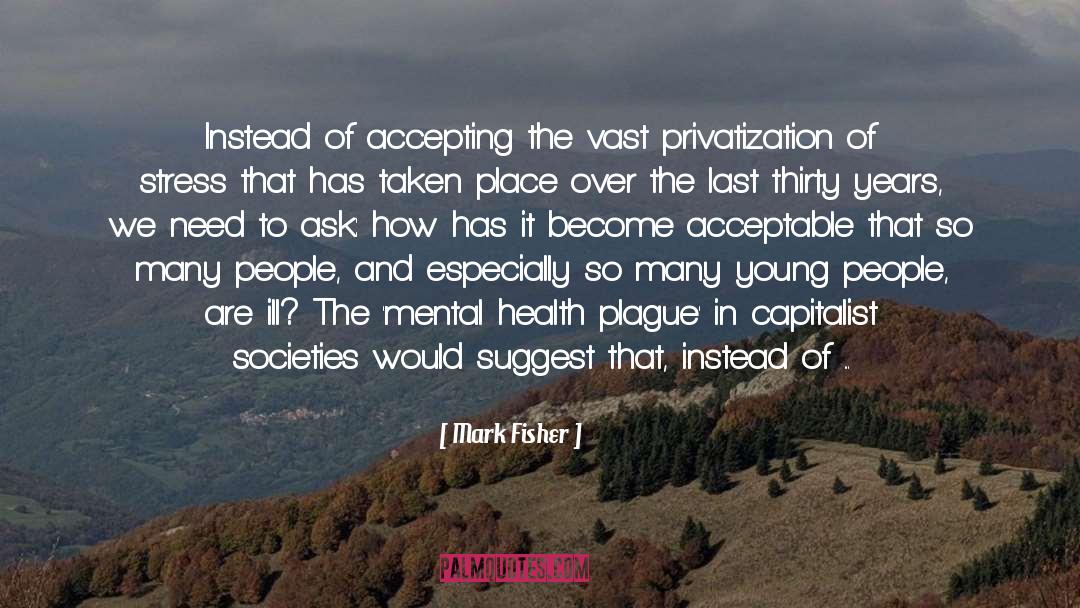
Capitalist ideology in general, Zizek maintains, consists precisely in the overvaluing of belief - in the sense of inner subjective attitude - at the expense of the beliefs we exhibit and externalize in our behavior. So long as we believe (in our hearts) that capitalism is bad, we are free to continue to participate in capitalist exchange. According to Zizek, capitalism in general relies on this structure of disavowal. We believe that money is only a meaningless token of no intrinsic worth, yet we act as if it has a holy value. Moreover, this behavior precisely depends upon the prior disavowal - we are able to fetishize money in our actions only because we have already taken an ironic distance towards money in our heads.
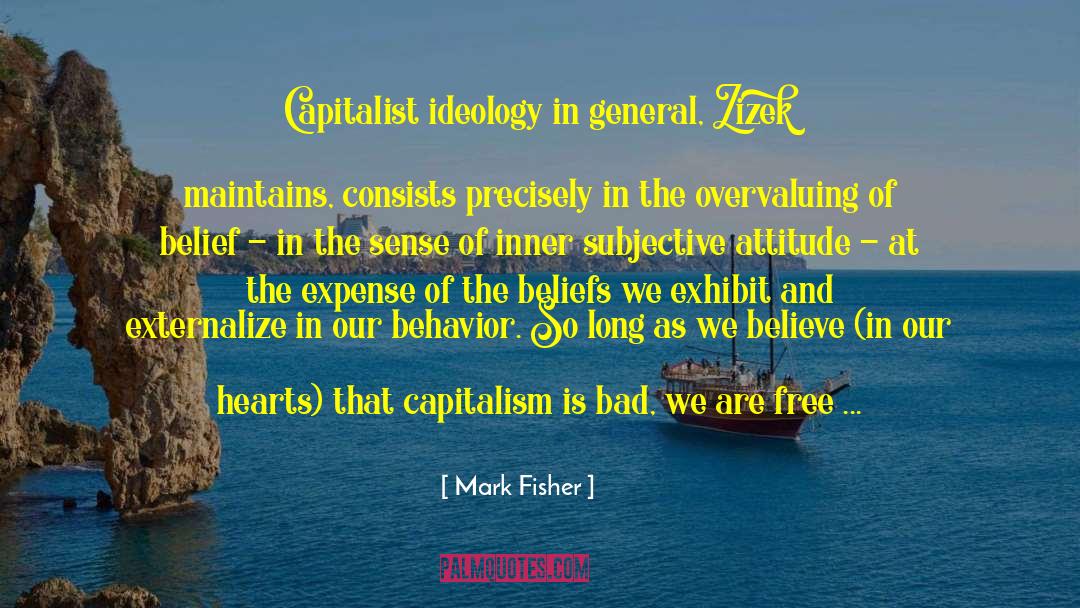
No one is bored, everything is boring

The pandemic of mental anguish that afflicts our time cannot be properly understood, or healed, if viewed as a private problem suffered by damaged individuals.

Deleuze and Guattari describe capitalism as a kind of dark potentiality which haunted all previous social systems. Capital, they argue, is the 'unnamable Thing', the abomination, which primitive and feudal societies 'warded off in advance'. When it actually arrives, capitalism brings with it a massive desacralization of culture. It is a system which is no longer governed by any transcendent Law; on the contrary, it dismantles all such codes, only to re-install them on an ad hoc basis.

The post-68 left has tended to overvalue the negative capability of remaining in doubt, scepticism and uncertainties - this may be an aesthetic virtue, but it is a political vice. The self-doubt that has been endemic on the left since the 60s is little in evidence on the right – one reason that the right has been so successful in imposing its programme. Many on the left now quail at the thought of formulating a programme, still less "imposing" one. But we have to give up on the belief that people will spontaneously turn to the left, or that neoliberalism will collapse without our actively dismantling it.

Those who can't remember the past are condemned to have it resold to them forever.

To reclaim a real political agency means first of all accepting our insertion at the level of desire in the remorseless meat-grinder of Capital. What is being disavowed in the abjection of evil and ignorance onto fantasmatic Others is our own complicity in planetary networks of oppression. What needs to be kept in mind is both that capitalism is a hyper-abstract impersonal structure and that it would be nothing without our co-operation. The most Gothic description of Capital is also the most accurate. Capital is an abstract parasite, an insatiable vampire and zombie-maker; but the living flesh it converts into dead labor is ours, and the zombies it makes are us. There is a sense in which it simply is the case that the political elite are our servants; the miserable service they provide from us is to launder our libidos, to obligingly re-present for us our disavowed desires as if they had nothing to do with us. The
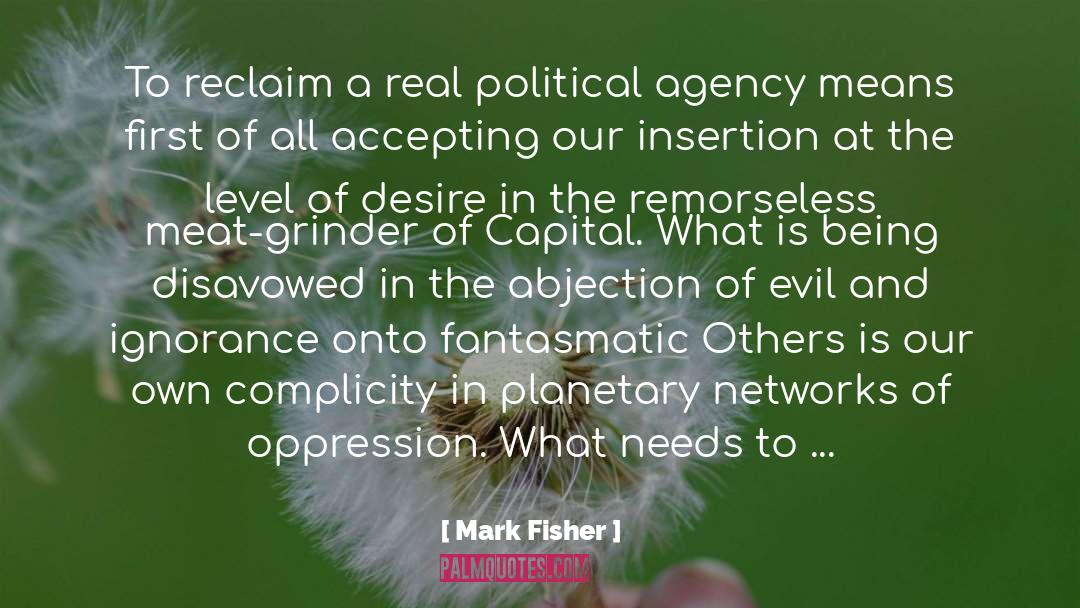
The idealized market was supposed to deliver 'friction free' exchanges, in which the desires of consumers would be met directly, without the need for intervention or mediation by regulatory agencies. Yet the drive to assess the performance of workers and to measure forms of labor which, by their nature, are resistant to quantification, has inevitably required additional layers of management and bureaucracy. What we have is not a direct comparison of workers' performance or output, but a comparison between the audited representation of that performance and output. Inevitably, a short-circuiting occurs, and work becomes geared towards the generation and massaging of representations rather than to the official goals of the work itself. Indeed, an anthropological study of local government in Britain argues that 'More effort goes into ensuring that a local authority's services are represented correctly than goes into actually improving those services'. This reversal of priorities is one of the hallmarks of a system which can be characterized without hyperbole as 'market Stalinism'. What late capitalism repeats from Stalinism is just this valuing of symbols of achievement over actual achievement.
[…]
It would be a mistake to regard this market Stalinism as some deviation from the 'true spirit' of capitalism. On the contrary, it would be better to say that an essential dimension of Stalinism was inhibited by its association with a social project like socialism and can only
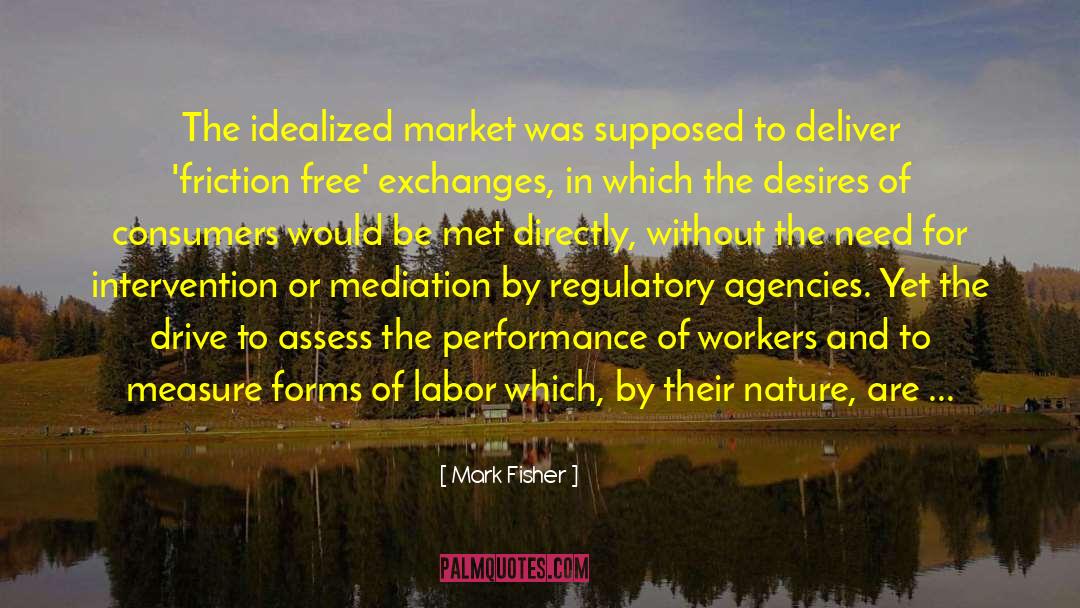
Fukuyama's thesis that history has climaxed with liberal capitalism may have been widely derided, but it is accepted, even assumed, at the level of the cultural unconscious. It should be remembered, though, that even when Fukuyama advanced it, the idea that history had reached a 'terminal beach' was not merely triumphalist. Fukuyama warned that his radiant city would be haunted, but he thought its specters would be Nietzschean rather than Marxian. Some of Nietzsche's most prescient pages are those in which he describes the 'oversaturation of an age with history'. 'It leads an age into a dangerous mood of irony in regard to itself', he wrote in Untimely Meditations, 'and subsequently into the even more dangerous mood of cynicism', in which 'cosmopolitan fingering', a detached spectatorialism, replaces engagement and involvement. This is the condition of Nietzsche's Last Man, who has seen everything, but is decadently enfeebled precisely by this excess of (self) awareness.

If capitalist realism is so seamless, and if current forms of resistance are so hopeless and impotent, where can an effective challenge come from? A moral critique of capitalism, emphasizing the ways in which it leads to suffering, only reinforces capitalist realism. Poverty, famine and war can be presented as an inevitable part of reality, while the hope that these forms of suffering could be eliminated easily painted as naive utopianism. Capitalist realism can only be threatened if it is shown to be in some way inconsistent or untenable; if, that is to say, capitalism's ostensible 'realism' turns out to be nothing of the sort.
